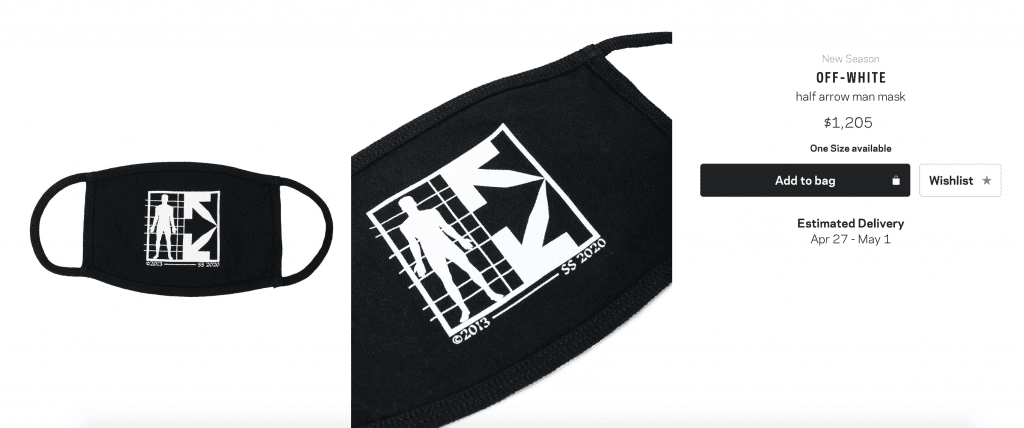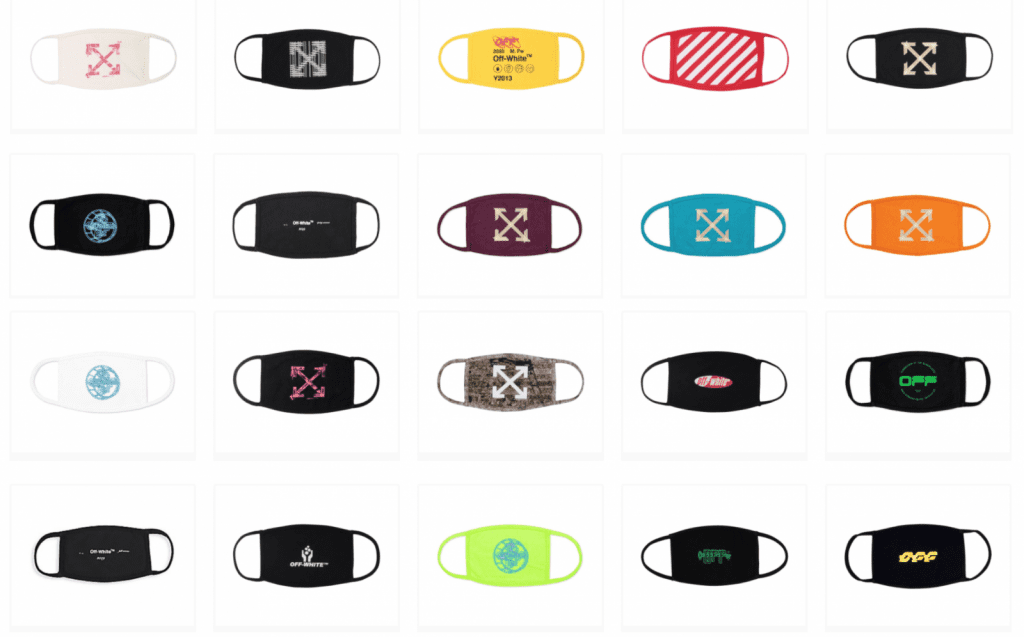On Friday, Off-White and Farfetch garnered quite a bit of buzz on social media, albeit it was necessarily the good kind. Both parties came under fire, as Farfetch was offering Off-White face masks for sale for upwards of $600, with price tags reaching $1,205 for at least one style of mask that was labeled as being from the brand’s Spring/Summer 2020 collection. By the end of the day, the masks had been all but scrubbed from the London-headquartered e-commerce platform, but not before consumers and media outlets got wind of the prices of the masks.
The sale of the masks themselves, at prices topping the $600 mark (very similar ones were being offered for $100 by retailer SSENSE just a couple of seasons before) is the latest example of pandemic-related price-gouging, something that has been running rampant in the market over the past month – with everything from hand sanitizer to medical-grade and non-medical grade masks being subject to spiking price tags – in light of the global spread of the COVID-19 virus.
Farfetch – which is operates as a platform of “boutique partners” (i.e., authorized retailers), such as Browns in London and Atelier in New York – said on Friday that it “blocked the sale of face masks at excessive prices,” noting that “as a marketplace, we do not set prices, but where we think consumers are being disadvantaged, we intervene, and in this case we have.”
Regardless of how the masks ended up on FarFetch – which actually owns Off-White licensor New Guards Group, the entity tasked with manufacturing and distributing Off-White’s wares – with aggressively inflated price tags that were multiples of at least 6 times the regular price, the end result mirrors the one that is currently being faced by 3M – to some extent.
In recent weeks, 3M, the maker of the heavily in-demand N95 respirators and other high-grade masks, has been faced with third-party sellers of its masks raising prices by many multiples due to rising demand. Such “unlawful price-gouging” prompted the St. Paul, Minnesota-headquartered industrial and safety supply conglomerate to haul these unauthorized sellers into court.
In a steadily-growing number of newly-filed trademark infringement and unfair competition lawsuits, 3M accuses third parties, such as Rx2Live, LLC and Performance Supply, LLC, of marketing and selling authentic 3M masks en masse at “grossly inflated purchase prices.” Specifically, 3M alleges that the defendants are selling masks at “500 percent to 600 percent above [its] list price,” while it “has not increased the prices that it charges for [its masks] as a result of the COVID-19 outbreak.”
One of its reasons for filing suit? 3M said that it aimed to stop “wrongdoers [from] seeking to exploit the current public health emergency and prey on innocent parties through a variety of scams involving [its] respirators and other products in high demand.” Beyond that, though, given that the masks at play were seemingly authentic ones (as 3M does not actually accuse the defendants of selling counterfeit or otherwise infringing masks, and instead, focuses on their unauthorized use of its 3M trademark in the marketing of those masks, which the company characterizes as the defendants’ attempts to appear to be connected with 3M when they are not), 3M is also likely motivated by a desire to avoid landing on the wrong side of the court of public opinion.
In short: 3M likely does not want to look like it is jacking up the prices of its products during a global health pandemic when it is not. (The unauthorized resellers are the ones doing that).

This is where Off-White – and others buzzy brands like Bape, whose masks have been selling for as much as $700 on resale sites like StockX in recent weeks, according to Input – come in. While Off-White is not actually stocking masks on its own e-commerce site at the moment, the fact that they were being offered up on Farfetch at eye-popping prices has largely been viewed as off-putting in the yes of consumers.
If the internet furor regarding the sky-high prices for Off-White’s branded masks is any indication, such a situation does not bode well for the brand whose name and logo appears on the goods at issue. In this case, no shortage of the concern over the seemingly gouged prices was directed at Off-White even though the brand almost certainly did not set the prices.
Such a scenario falls neatly within a larger trend of brands – from 3M in connection with its masks to and luxury goods brands, such as Chanel (which is suing The RealReal), as well as Birkenstock and Swatch (both of which have taken on Amazon) – increasingly attempting to exercise control over the sale of authentic products that bear their names and logos. This instance also puts into perspective, in some sense, why at least some brands are working overtime to regulate how even authentic products bearing their names are sold.
Is the risk of reputational harm that is at hand – as linked to such seeming price-gouging – enough to give rise to merited legal claims? In other words, is price-gouging enough to enable brands to successfully sue?
Well, probably not on trademark grounds. As Mark McKenna, the acting Director of Notre Dame Technology Ethics Center and Director of Notre Dame Law School’s Program on Intellectual Property & Technology Law, stated in connection with 3M’s suits, the fact that the defendants are significantly inflating the prices of the masks “is 3M’s motivation [for filing such suits],” but the act of price-gouging, itself, “it is not relevant to its trademark claims.”
As is a well-established trademark rule, trademark holders “do not get to control the re-sale of genuine goods,” which is established by the First Sale Doctrine, the trademark (and copyright) tenet that cuts off a trademark holder’s right to police to use of its mark on a product that it has released into the mark (meaning its right to control the distribution of the good via trademark claims is exhausted).
3M goes beyond trademark infringement claims in at least one of its latest suits, though, the case that it filed against Rx2Live, LLC in a federal court in California, by asserting a claim of unfair competition under California’s state Business and Professions Code (section 17200). The company pointing to the defendant’s “price-gouging and false advertising of 3M-branded products,” which it says violates a California penal code provision that makes “price-gouging illegal in all California communities during [a] declared state of emergency,” and therefore, amounts to “an act of unfair competition,” in addition to “being a crime.”
Should other brands seek to crack down on price-gouging resellers or retailers, they may be able to rely on similar state law claims. In New York, for instance, the state’s General Business Law “prohibits the sale of goods and services necessary for the health, safety, and welfare of consumers at unconscionably excessive prices during any abnormal disruption of the market.” While examples of such “essential” goods are not explicitly set out in the statute, they have been deemed to include everything from hand sanitizers and disinfectant sprays to personal protective equipment.
While it would almost certainly be difficult to establish that luxury masks are “necessary for the health, safety, and welfare of consumers” in the same way as, say, 3M’s N95 respirators, it might not be impossible. After all, the description of at least one of Off-White’s price-gouged masks on Farfetch specifically stated that it would “stop … germs,” which could mean that there is a chance that these products would fall within this camp of protective – and thus, necessary – goods.
Ultimately, given the very real risk of reputation damage that comes with scenarios of price-gouging by third parties, as indicated by social media-centric fury that was directed at Off-White last week and over the weekend, it becomes clear why brands might be prompted to take legal action to protect themselves (and the goodwill associated with their name) from the actions of rogue resellers and retailers, particularly in times of crisis. Or to put it another way, as AdAge asserted recently, “We live in a hypersensitive environment, and people are skeptical of [brands across the board],” which means that “missteps” can be costly, and might even cost “your ultimate brand reputation.”
As for whether other brands will, in fact, follow 3M’s lead, and whether such claims will actually stand up in court (particularly when it comes to the trademark-specific angle), that is yet to be seen.











